Politics
Return of refugees to post-Assad Syria from Türkiye doubles
Since the Dec. 8 end of the Baathist regime in Syria, the number of people heading home from Türkiye has neared 300,000. As schools were closed in Türkiye, more families whose children attended Turkish schools left for their country. Daily crossings from the Turkish border surpassed 2,500, according to official figures quoted by Sabah newspaper on Saturday, indicating the trend will continue this summer.
Türkiye has been home to millions of Syrian refugees since the civil war broke out in that country in 2011. When the Assad regime collapsed due to an opposition push last December, refugees started eyeing quick returns. Türkiye eased restrictions on its border crossings with its southern neighbor after the fall of the regime, but the number of returnees fluctuated between 1,300 and 1,400 people daily initially.
Authorities were expecting a climb in returns when the schools started summer recess in June, and projections proved true. After June 20, daily crossings reached 2,500. At one point, numbers receded due to the Iran-Israel conflict that threatened to push the region into another episode of turmoil, but following a fragile cease-fire between the two countries, crossings increased again. The border gates have a capacity allowing the crossing of 3,000 people daily as they undergo comprehensive checks before traveling into Syria.
Türkiye expects more Syrians will return home in the coming months, near the end of summer, with the return of Syrians working as seasonal laborers in fields and orchards across Türkiye, from Mersin and Antalya to provinces of Burdur and Isparta.
The number of those returning to Syria from Türkiye surpassed 1 million when the number of those relocating to areas liberated from terrorists by Türkiye’s Operation Olive Branch in northern Syria in 2018 is added. Türkiye still hosts around 2.6 million Syrian refugees.
U.N. refugee agency chief Filippo Grandi has urged more international support for Syria to speed up reconstruction and enable further refugee returns.
“I am here also to really make an appeal to the international community to provide more help, more assistance to the Syrian government in this big challenge of recovery of the country,” Grandi told reporters earlier this month on the sidelines of a visit to Damascus.
The wide-scale destruction, including to basic infrastructure, remains a major barrier to returns.
Grandi said over 2 million people had returned to their areas of origin, including around 1.5 million internally displaced people, while some 600,000 others have come back from neighboring countries, including Lebanon, Jordan and Türkiye.
“Two million, of course, is only a fraction of the very big number of Syrian refugees and displaced, but it is a very big figure,” he said.
According to UNHCR, some 13.5 million Syrians remain displaced internally or abroad.
Syria’s conflict displaced around half the prewar population, with many internally displaced people seeking refuge in camps in the northwest.
Grandi said that after Assad’s toppling, the main obstacle to returns was “a lack of services, lack of housing, lack of work,” adding that his agency was working with Syrian authorities and governments in the region “to help people go back.”
He said he discussed the importance of the sustainability of returns with Syrian Foreign Minister Asaad al-Shaibani, including ensuring “that people don’t move again because they don’t have a house or they don’t have a job or they don’t have electricity” or other services such as health.
Sustainable returns “can only happen if there is recovery, reconstruction in Syria, not just for the returnees, for all Syrians,” he said.
He added that he also discussed with Shaibani how to “encourage donors to give more resources for this sustainability.”
With the recent lifting of Western sanctions, the new Syrian authorities hope for international support to launch reconstruction, which the U.N. estimates could cost more than $400 billion.
Politics
Macron, top EU official back Armenia’s peace efforts with neighbors
French President Emmanuel Macron and EU foreign policy chief Kaja Kallas expressed support for Armenia’s efforts to maintain peace with Azerbaijan and Türkiye.
In a phone call with Armenian Prime Minister Nikol Pashinyan on Sunday, Macron voiced strong support for Armenia’s democratic institutions and Pashinyan’s efforts to achieve peace with Azerbaijan and normalize relations with Türkiye, according to statements by both leaders.
“I reiterated our support for his courageous efforts to make peace with Azerbaijan and normalize relations with Türkiye,” Macron said after a phone call with Pashinyan, emphasizing that “peace and opening of borders would be a major development for the whole region.” Pashinyan confirmed the conversation, noting that they discussed “key issues on the bilateral, regional & international agenda, including the Armenian government’s peace strategy.” He thanked Macron for his “personal contribution to strengthening Armenia-France ties.”
France, which hosts one of the largest Armenian communities in the world, maintains close ties with Armenia. Under Macron, France had somewhat turbulent relations with Türkiye, owing to disagreements over a series of international issues, although conflicts in the Middle East and between Russia and Ukraine brought them closer together again. President Recep Tayyip Erdoğan, who received Pashinyan a few weeks ago in his first official bilateral visit, met Macron last week on the sidelines of a NATO summit in the Netherlands.
Meanwhile, the EU foreign policy chief on Sunday pledged support for Armenia’s democratic reforms and peace efforts during her first official visit to Yerevan, where both sides reaffirmed their commitment to deeper ties and regional stability. Kaja Kallas met with Armenian President Vahagn Khachaturyan, who described EU-Armenia cooperation as “successful” across political, economic and governance sectors. “Armenia has adopted a path of democracy,” Khachaturyan said, expressing appreciation for EU support in addressing foreign policy challenges.
Kallas, for her part, underscored the EU’s interest in promoting “sustainable peace” in the South Caucasus and highlighted the importance of democratic reforms and resilience. “We discussed deepening of EU-Armenia relations, EU support to reforms and building resilience and prosperity,” she said on X. “It is key to ensure peace and stability in the region.”
The two sides also discussed cooperation in renewable energy and EU support for justice, anti-corruption and institutional reforms in Armenia.
Khachaturyan reiterated Armenia’s intention to pursue good-neighborly relations with all regional actors and emphasized the country’s peace-oriented foreign policy.
Politics
Erdoğan vows solidarity with Pakistan after terror attack
President Recep Tayyip Erdoğan on Sunday issued a message condemning Saturday’s terror attack targeting Pakistani troops. He underlined that Türkiye would stand with Pakistan in its fight against terrorism.
At least 13 Pakistani soldiers were killed Saturday in a suicide bombing in the country’s northwestern Khyber Pakhtunkhwa province near the Afghan border, while 14 terrorists were killed by the military in subsequent operations, the Pakistani army said.
According to a Pakistani army statement, three civilians, including two children and a woman, were “severely injured” in the attack.
It accused India of being behind the attack. “In a cowardly attack, planned and orchestrated by the terrorist state of India, and executed by its proxy Fitna al Khwarij, a Security Forces convoy was targeted today in general area Mir Ali, North Waziristan District,” it said.
Rejecting the allegation, the Indian External Affairs Ministry said: “We have seen an official statement by the Pakistan Army seeking to blame India for the attack in Waziristan on 28 June. We reject this statement with the contempt it deserves.”
The attack is one of the deadliest single-day attacks on security forces in recent months in the Khyber Pakhtunkhwa province.
Pakistani Prime Minister Shehbaz Sharif “strongly condemned” the attack and praised the army for the operation that killed the 14 terrorists, according to a Prime Minister’s Office statement.
A local militant group led by Hafiz Gulbahadar of North Waziristan has claimed responsibility for the attack.
Islamabad accuses Tehreek-e-Taliban Pakistan (TTP) militants, who are allegedly based in Afghanistan, of carrying out terrorist attacks in Pakistan, while Kabul denies that such attacks are launched from its soil.
In a message published on his social media account, Erdoğan wished a speedy recovery for those injured in the heinous attacks and extended condolences to the “brotherly and friendly people of Pakistan and its government.” “Türkiye will continue supporting its old friend Pakistan in its counterterrorism efforts as it did and does in other fields. We will stand with our brothers in the tough times as we did in their good days,” he wrote.
Separately, the Turkish Foreign Ministry said in a written statement on Saturday that they were deeply saddened by the loss of lives and many injuries caused by the terrorist attack. It expressed that Türkiye stands in solidarity with Pakistan in its fight against terrorism. “We strongly condemn this heinous attack, wish Allah’s mercy upon those who lost their lives and a speedy recovery to the injured.”
Türkiye and Pakistan maintain close ties and their friendship even led to a disinformation campaign targeting Türkiye and boycott calls by the Indian public during recent tensions between Pakistan and India that followed a terrorist attack.
Politics
Türkiye key to stability in Middle East: US envoy
U.S. Ambassador to Türkiye and Special Envoy for Syria Thomas J. Barrack said he considers Türkiye the key actor in the Middle East for stability amid ongoing conflicts.
Speaking to Anadolu Agency (AA) on Sunday as he visited western city of Izmir, Barrack called for “new dialogue” in the region. Barrack’s remarks come amid a brief but tense conflict between Israel and Iran after Israel’s attacks on Iran earlier this month and ongoing genocidal aggression of the Netanyahu administration targeting Palestinians.
“Israel needs to be redefined. It’s currently going through that process,” Barrack said. “What is happening between Israel and Iran is a signal for all of us that the time is up, it’s time to carve a new path. And the key to that path is Türkiye.”
Barrack underlined the personal relationship between U.S. President Donald Trump and President Recep Tayyip Erdoğan, adding that U.S. Secretary of State Marco Rubio and Foreign Minister Hakan Fidan share a similar rapport.
“At a critically important time in history, these four individuals have built a relationship based on trust, mutual understanding and closeness,” Barrack said. “There’s an enormous opportunity because we have two leaders who trust each other, supported by ministers who know exactly how to execute this vision.”
He pointed to the two phone calls between Trump and Erdoğan as pivotal in building this trust.
Barrack stressed that the U.S. has always viewed Türkiye as a vital NATO ally, but argued that the country hasn’t always been given the recognition it deserves as a major regional actor.
“The chaos in the Middle East has been perpetuated, in large part, by constant Western interventions,” he said. “But Trump and Erdoğan see this as an opportunity to shift the dialogue and that takes bold leadership.”
“I believe Türkiye is at the center of all this, as we’ve seen in Syria,” he added, noting Türkiye’s crucial role in regional developments.
Asked whether there is progress in reversing the U.S. sanctions under the Countering America’s Adversaries Through Sanctions Act (CAATSA) and restoring Türkiye’s participation in the F-35 fighter jet program, Barrack responded, “Absolutely yes.”
He emphasized that Türkiye remains a crucial partner for NATO, recalling that many parts of the F-35 are manufactured in Türkiye. He said both Trump and Erdoğan, along with Rubio and Fidan, are aligned on finding a solution.
“I believe by the end of this year, there’s a real chance for a resolution,” Barrack said, suggesting that Congress is prepared to look at the issue with fresh eyes.
“For the first time, the U.S. and Türkiye are not just defense partners but have a shared commitment to move from defense to breakthroughs, in diplomacy, security and cooperation,” he said.
Responding to a question about whether the current situation in Gaza affects expectations around expanding the Abraham Accords, Barrack said, “Despite the challenges, there’s no reason Israel cannot be integrated with the Muslim world.”
He noted that the process started with Trump’s first overseas visit to Riyadh in 2017, eventually leading to the Abraham Accords between Israel, the United Arab Emirates (UAE), Bahrain and Sudan. But he acknowledged that expanding those agreements while the Gaza conflict persists is a significant challenge.
“I still believe we’ll see a cease-fire in Gaza in the near future,” Barrack said. “Once that happens, we can begin moving toward non-conflict agreements between Israel and others, step by step.”
Barrack suggested that backchannel dialogues could begin between Israel and Syria, as well as Israel and Lebanon, focused initially on border security and broader conflict de-escalation.
“Syria’s new President Ahmed al-Sharaa does not harbor religious hatred toward Israel and has made clear his desire for border peace,” Barrack said.
“Israel wants the same. We’ll probably see initial discussions on simple issues like border security, which could grow into a broader peace dialogue,” he added.
He expressed hope that a similar framework could be applied to Lebanon.
“Why can’t we live in peace?” Barrack asked. “Regardless of anyone’s religious beliefs, that should be separate from politics.”
Addressing the U.S. approach to northeastern Syria, Barrack emphasized that the U.S. recognizes only one legitimate counterpart in Syria: the Syrian government.
“The entity known as the SDF, which includes elements like the PKK/YPG, cooperated with U.S. forces in the fight against (Daesh),” he said, referring to the Syrian wing of the terrorist group that has killed thousands in Türkiye since 1980s. “But the SDF must now be integrated, both militarily and politically, into the new Syria, just like the Alawites, Druze, and others seek representation.” This transformation, Barrack acknowledged, will take time.
Barrack praised Türkiye’s defense industry, specifically citing the success of Turkish drones like the Bayraktar TB2, and commended Turkish Airlines as one of the world’s best carriers.
“Türkiye has the second-largest army in NATO. It possesses air defense, hard power, and all the key elements of security — but more importantly, it has an extraordinary, hardworking population that understands the world,” Barrack said. “This is something President Trump recognizes.
He concluded, “The key to solving the regional crisis runs through Türkiye.”
Politics
Türkiye’s CHP seeks Germany’s aid as it faces moment of truth
Two days before a trial that may end his reign at the Republican People’s Party (CHP), Turkish main opposition leader Özgür Özel was in Germany, calling for support. Speaking at the Social Democratic Party (SPD) conference in Berlin, Özel sought to rally like-minded German counterparts for his party tainted with allegations of corruption, going all the way up to his office. In response, the SPD passed a motion calling for the release of CHP’s Istanbul mayor, Ekrem Imamoğlu, but they had no words for Özel himself.
On Monday, a court in Ankara will decide upon the legitimacy of an intraparty election held in November 2023 that brought Özel to power in Türkiye’s oldest party. Özel’s supporters in the party, including Imamoğlu who was arrested in March on separate graft charges related to his alleged wrongdoings at Istanbul Metropolitan Municipality, are accused of buying votes for Özel during the 2023 election in which he ran against Kemal Kılıçdaroğlu. If the court rules for cancelation of the election, the CHP will have a chance to appeal the verdict, a process that may take months and prolong Özel’s tenure. If the court rules for “absolute nullification,” the election will be deemed invalid and the party’s top seat will either be handed to Özel’s predecessor Kılıçdaroğlu or a trustee will be appointed before a new election. Kılıçdaroğlu, at the cost of alienating himself with his party now dominated by pro-Özel circles, expressed that he was open to take the reins again, instead of “seeing the party run by a trustee.”
In Germany, Özel renewed his party’s pledge to achieve full EU membership if they came to power and urged Europe to prioritize “democracy” instead of economic or security policy interests. Although the EU has sometimes had shaky relations with Türkiye under the leadership of President Recep Tayyip Erdoğan, it still prizes cooperation with the government, especially in terms of security under the shadow of the Russia-Ukraine conflict. Türkiye plays a critical role as a country enjoying good ties with both sides of the conflict, as well as the main actor in the southeastern flank of NATO where it commands the second-largest army of the alliance. In addition, the EU recently courted Ankara for partnership in the defense industry, something even foes of Türkiye acknowledge as spectacularly enhanced with locally made uncrewed aerial vehicles and fighter jets.
Even if the CHP wins the court battle against allegations of vote buying, Imamoğlu, who was declared a future presidential candidate of the party after his arrest, will have a hard time to vindicate him as more people come forward to confess the wrongdoings of the alleged criminal network set up by the former mayor to enrich himself and other CHP members.
Addressing an event in Istanbul on Saturday, President Erdoğan slammed how the opposition looted resources of Istanbul. “Their own bureaucrats, people they did business with openly confess their wrongdoings. It is now clear how resources that should be spent for the public are spent for designing the political ambitions,” he said, referring to offers of cash, jobs and privileges allegedly made to CHP delegates in exchange of voting for Özel in the 2023 intraparty election.
“More tentacles of the octopus are being uncovered,” Erdoğan added, referring to his earlier analogy about party’s network of corruption.
“Nowadays, all they can think about is the shady election and the possible absolute nullification of the election,” he said.
“It is sad to see the chair of a party that boasts being part of the National Forces (which fought invaders during post-World War One battle of independence) beg for democracy from foreign politicians. He kowtows to them so that they would exert pressure on us. They did nothing good for this country and their toxic politics is harming Türkiye and its economy,” he said.
Politics
Libya, Türkiye defend deal as Greece sustains objection
Greece is pushing again against a 2019 maritime deal between Türkiye and Libya. After Ankara, Libya’s eastern Benghazi-based government on Saturday rejected recent remarks from Greek officials about the legitimacy of the deal.
Libyan Prime Minister Osama Hammad stated that the deal between the two countries is internationally legitimate. He reaffirmed Libya’s firm rejection of any challenges or interference with its sovereign decisions, particularly regarding international agreements made with allies.
The Libya-Türkiye cooperation is carried out under international legitimacy and does not violate the sovereignty of any country, Hammad noted.
He emphasized that Libya reserves the right to respond firmly to any actions that jeopardize its territorial integrity or political sovereignty, and he warned Greece about the consequences of continuing its policy of provocation and escalation. Hammad also emphasized that Libya’s maritime rights are nonnegotiable and can only be discussed within international legal frameworks, noting that his government has taken decisive steps in response to Greece’s recent attitudes.
Greek Prime Minister Kyriakos Mitsotakis’ statements targeting the deal have provoked serious reactions from authorities in eastern and western Libya.
The Libyan National Unity Government had expressed deep concern in a June 19 statement regarding the announcement by Greece in the Official Journal of the EU on June 12 for tenders for hydrocarbon exploration and exploitation in the areas disputed with Libya, south of the island of Crete.
The Libyan National Unity Government statement, which emphasized the importance of respecting international law, said the steps are a clear violation of Libya’s sovereign rights, expressing clear objection to any exploration or drilling activity in those areas without a prior legal framework that respects the rules of international law.
It urged Greece to adopt constructive dialogue and negotiations based on international legal principles that consider the interests of all parties to reach fair and equitable solutions.
Türkiye on Friday said the conclusions adopted at the European Union leaders’ summit demonstrate that Greece and the Greek Cypriot administration continue efforts to impose their “maximalist claims,” which Ankara says violate international law and the principle of equity. “The results adopted at the European Union (EU) Leaders’ Summit held on June 26, 2025, demonstrate that Greece and the Greek Cypriot Administration of Southern Cyprus (GCASC) continue their efforts to impose their maximalist claims, which are contrary to international law and the principle of equity, on the EU,” Foreign Ministry spokesperson Öncü Keçeli wrote on X.
Keçeli reiterated Türkiye’s position that the 2019 Memorandum of Understanding signed with Libya on the delimitation of maritime jurisdictions in the Eastern Mediterranean is “entirely legitimate under international law.” He said the agreement clearly shows that Ankara will not allow violations of its lawful rights and interests in the region. He criticized the EU for issuing “politically motivated and biased” statements on a sensitive matter such as maritime delimitation, which he emphasized involves legal and technical complexities. “Instead of endorsing legally invalid claims, the EU should call on all its members to comply with international law,” Keçeli said. He added that Türkiye will continue to firmly defend its legitimate rights and interests in the Eastern Mediterranean within the framework of international law.
The 2019 maritime boundary agreement that includes provisions for Turkish hydrocarbon exploration within Libya’s territorial waters is still not fully implemented. In 2022, the two countries signed a hydrocarbons memorandum of understanding, paving the way for Turkish companies to conduct seismic surveys and drilling operations. The agreement took a new turn on June 25 when Turkish Petroleum (TPAO) signed a memorandum of understanding with Libya’s National Oil Corporation (NOC) for a 2D seismic survey in the Libyan waters. Under the memorandum, TPAO will conduct surveys in four offshore blocks off the Libyan coast, over an area covering 10,000 kilometers (6,213.71 miles). The data collected during the surveys will be processed within nine months.
After a long period of tensions marked by disputes over irregular migration, the Cyprus dispute, energy exploration and territorial sovereignty in the Aegean, Ankara and Athens have been taking confidence-building steps for a fragile normalization of their relations since late 2023. The normalization sustained momentum in the past two years, with talks between leaders as well as sporadic high-level meetings of top officials to discuss sources of dispute. Yet, both countries stand firm in their maritime rights, which are still not fully agreed upon after decades of hostilities dating back to the post-World War I period.
Politics
British FM set for inaugural diplomatic visit to Türkiye
In his first official bilateral visit to Türkiye, British Foreign Secretary David Lammy will be in Ankara on Monday. Lammy is scheduled to meet his Turkish counterpart Hakan Fidan, Foreign Ministry sources said on Sunday.
During the meeting, Fidan is expected to stress Türkiye’s commitment to its NATO ally and strategic partner, expressing satisfaction with the positive trajectory of bilateral relations and highlighting the aim to further strengthen cooperation across all fields.
The importance of continued close cooperation between relevant authorities in security and counterterrorism will be underlined, along with the recognition of economic, trade, financial, defense industry and tourism ties as driving forces in relations between the two countries.
The meeting is expected to stress the significance of negotiations aimed at updating the countries’ free trade agreement to accelerate economic ties and boost the trade volume between Türkiye and the U.K.
It is expected that Türkiye and Britain, two allies outside the European Union, will be emphasized as integral elements of Europe’s defense and security architecture, and that the need to strengthen cooperation between the two countries in the defense industry in light of the changing global security environment will be underlined.
The contributions to bilateral relations of nearly half a million Turkish-origin citizens living in the U.K. will be acknowledged in the meeting, and it is expected to be emphasized that close dialogue and coordinated cooperation between the two countries on regional and global issues remain important.
The talks will also address how a lasting solution to the Palestinian issue, which lies at the heart of many problems in the Middle East, is crucial for peace and stability in the region, also welcoming the recent cease-fire between Iran and Israel, and how negotiations should resume to resolve disagreements over nuclear energy.
The meeting will highlight the vital importance of ending the Russia-Ukraine war through diplomacy to achieve a just and sustainable peace and that following the lifting of sanctions on Syria, cooperation will be encouraged to help restore the country’s economic, infrastructure, and humanitarian capacities.
Türkiye and the U.K. are allies and established a “strategic partnership” in 2007.
Last year, Türkiye announced that it had agreed with the United Kingdom to initiate negotiations in Ankara to revise their free trade agreement (FTA), as the sides are looking for ways to strengthen economic ties. The agreement has been in place since the U.K.’s departure from the European Union in 2020. Lammy’s visit precedes technical talks to upgrade the FTA, which will take place soon, according to media reports.
-

 Daily Agenda3 days ago
Daily Agenda3 days ago32 arrests in doner operation connected to FETÖ
-
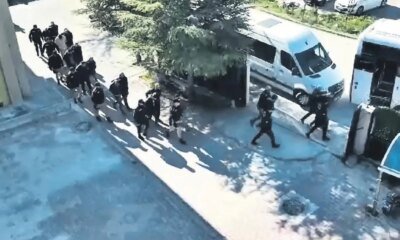
 Daily Agenda3 days ago
Daily Agenda3 days agoCrypos were deciphering – Breaking News
-
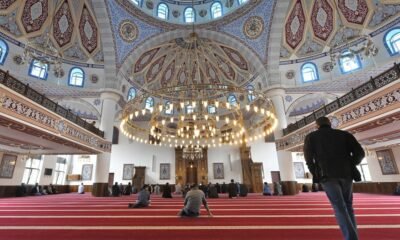
 Politics3 days ago
Politics3 days agoTurkish mosques in Germany under threat of increasing attacks
-
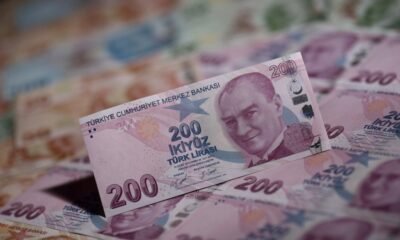
 Economy1 day ago
Economy1 day agoTürkiye advances toward exit from FX-protected scheme
-

 Daily Agenda3 days ago
Daily Agenda3 days agoMinister Ali Yerlikaya explained! Operation for Cyber Crimes in 48 provinces: 284 suspects were caught in 1 week
-
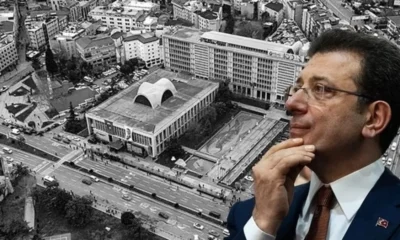
 Daily Agenda3 days ago
Daily Agenda3 days ago36 confessors in corruption investigation! Imamoglu’s key men told one by one: the bench broke down like this
-
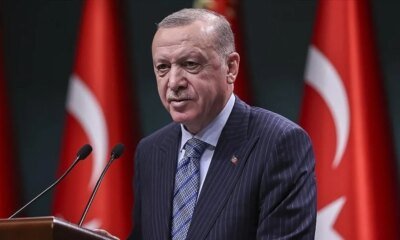
 Daily Agenda2 days ago
Daily Agenda2 days agoPresident Erdoğan listed the gospels one after the other! “Credit opportunities up to 10 million with 10 years of maturity”
-

 Sports1 day ago
Sports1 day agoChelsea set up Palmeiras clash after Club World Cup weather delay




